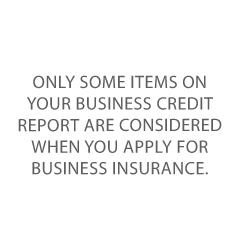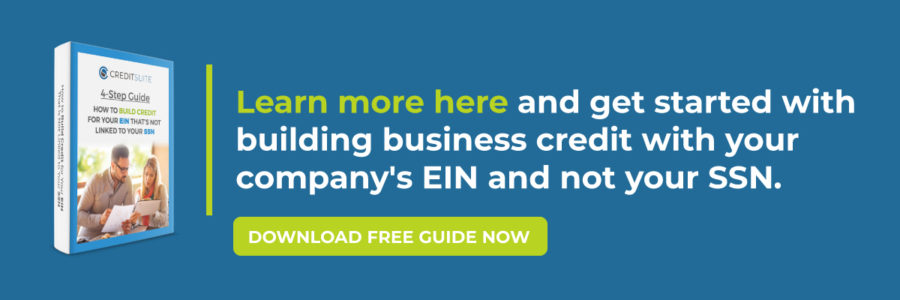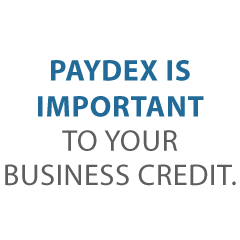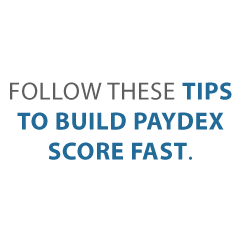
Does a High PAYDEX Drive Down My Business Insurance Premiums?
Did YOU Know That Your Business Credit Score Can Affect the Cost of Your Business Insurance?
A business credit score tends to not be necessary to apply for an insurance policy. But insurers may ask to access your business data after you apply. High credit scores correspond with low premiums and vice versa. That doesn’t mean you should ignore financials in favor of improving your credit score. Rather, if you improve your company’s credit history by paying down debt or working on payables management, then this could help you save money on business insurance premiums.
Get Ready Before You Apply
Getting ready to apply for business insurance is like preparing to apply for financing. You need to know certain details about your business. If you must have certain coverage before signing a lease or contract, understanding the required coverage will also be key before applying. Doing your due diligence beforehand will save you time and maybe even money.
Part of due diligence is looking for an agent. Make sure you work with an agent who understands your business needs and the best options for you. Then the process can go much more smoothly. It is best practices to find an agent specializing in your industry. Their expert advice can be helpful in the process.
Your Credit Could Affect What You Pay for General Liability Insurance
Data your insurer uses revolves around correlation. Poor credit tends to mean a higher risk. Insurance is all about probability, and the data shows a higher chance of frequent claims and overdue payments, when insurers cover someone with bad credit.
What If You Don’t Have Business Credit Yet?
Having no business credit score won’t prevent you from buying general liability insurance. And it won’t keep you from getting a decent premium. But a good business credit score might get you solid discounts. So, it makes sense to start building PAYDEX and other business credit scores.
Are Your Business Insurance Premiums Affected by What’s in Your Business Credit Reports?
Many business owners have no idea their insurance rate is affected by their credit report. But let’s consider personal credit for a moment. And, since Experian business scores (in part) come from personal credit scores, it does apply to your business credit.
Statistics show that people with high personal credit scores file fewer claims than those with low credit scores, and those with higher scores are less likely to have traffic accidents and traffic violations. Additionally, history in a credit report can show if a business or an individual will pay insurance premiums on time or at all. For that reason, federal law lets insurance companies look at items from your credit report. Carriers do not have to tell you they are using your credit report.
How Insurers Use Your Business Insurance Credit Score
Rates are based on a narrow set of information in your credit report. Carriers can only use those specific types of information; this information together is your insurance credit score. The insurance credit score does not include your FICO score.
The score does include items like the pattern of monthly bill payments, collection activity, total number of outstanding loans, and total number of credit cards. Under the law, your rates cannot increase if you do not have enough credit history to calculate a credit score. If you want to see what your personal insurance credit score is, you can buy a copy of the report from True Credit, a division of Transunion.
It’s smart to review your insurance credit report and make certain everything in it is correct. It is important that you do this to get the best rate you can find.
Using Insurance Credit Scores for Business Insurance
Only some items on your business credit report are considered when you apply for business insurance. The insurance credit score only considers areas of your credit report which apply to the insurance industry. It is against the law to deny an insurance policy based on a lack of credit history.
The items your business carrier will look at include:
- Number of business credit cards
- Number of outstanding loans and other debt
- Average time in which your company pays its monthly bills
- Collection activity, if any; and
- Length of credit history
Items that insurance companies CANNOT use when checking an insurance credit report include:
- Amount of credit available
- Number of credit inquiries in your company’s credit file
- Type of credit history or not enough credit history to develop a score
- Types or issuers of credit cards and debit cards your business carries
Does it Matter So Much if You Don’t Think You Need a Lot of Insurance?
It matters because you can’t get by with no business insurance! Every small business owner needs certain insurance policies to protect them in case the worst happens.
Differing industries will have different degrees of risk. Examine your risks and put together a business insurance plan based on that information. Shop around and find the right carrier for your small business. There are nine basic types of business insurance every small business may need to protect a business.
#9. General Liability Insurance
Every business needs general liability insurance. It will cover:
- third-party bodily injury
- third-party property damage
- advertising injury (accusations of libel, slander, copyright infringement, etc.)
The type of your business, its size, assets, and corporate structure will determine the amount of coverage you need. But this policy won’t cover motor vehicles.
#8. Commercial Property Insurance
If you have a physical address, you should carry commercial property insurance to cover losses of business or personal property. This type of policy usually covers damage to the structure and inventory or property within it from damage from storms, fire, theft, or vandalism. Dovetailing with commercial property insurance, it might also make sense to look at a business owners’ policy (BOP) depending on the size and assets of your business.
Insurance companies will sometimes offer a BOP to small and medium-sized businesses. A BOP policy will usually combine general liability, property insurance, and business interruption coverage. You can often add riders to such a policy. It can be more affordable to bundle the coverage you already need.
#7. Business Interruption Insurance
If property sustains damages, you may not be able to keep your business open during repairs. Hence business interruption insurance can help cover financial losses. It can cover your employee payroll, taxes, operating expenses, debt repayment, and sometimes the cost of a temporary location. Many business owners used business interruption insurance during the height of the Covid-19 pandemic when they had to close their doors.
#6. Workers’ Compensation Insurance
If you hire employees to work in your business, you’re legally required in most states to get workers’ compensation insurance. Workers’ comp protects you and your employees if they’re injured or become ill at work. It can cover an employees’ medical expenses and lost wages while recuperating. If an employee agrees to accept workers’ compensation as part of their hiring package, they often waive the right to sue you for an incident at work.
#5. Commercial Auto Insurance
If you use a vehicle for business purposes, then you need commercial auto insurance. Because if you get in an accident while doing business-related work, your personal car insurance may not cover it. Some insurers will require separate policies for dump trucks and semis.
#4. Product Liability Insurance
If you manufacture or sell any type of product, you can be held liable if that product injures someone, damages their property, or makes them sick. Product liability insurance can help cover associated medical costs, replacement of the purchased product, and even legal fees and settlement costs if your business is sued. Distributors and sellers can be the subject of product liability lawsuits, so, they should consider this form of coverage.
#3. Cyber Liability Insurance
If your business is the subject of a data breach and customer information was accessed or stolen, cyber liability insurance can:
- Notify anyone impacted by the breach
- Give them credit monitoring
- Cover the costs of informing the public (if necessary)
Some insurers call this data breach insurance. Anyone who stores customer information electronically should get it, as your general liability policy won’t cover this.
#2. Professional Liability Insurance
If you run a business where you offer professional advice or are responsible for completing projects—such as a doctor, lawyer, or architect—you need to carry professional liability insurance. It’s also called errors and omissions insurance. This policy can protect you and your business if you’re accused of negligence (or were negligent), missed deadlines, undelivered services, or breach of nondisclosure/copyright insurance. Doctors and other professionals often must carry a specialized type of professional liability—malpractice insurance. But even plumbers, realtors, and event planners can use professional liability coverage.
#1. Commercial Umbrella Insurance
At times, it can be more affordable for a small business to purchase an umbrella policy, instead of increasing the limits of an underlying policy. An umbrella policy may also cover business risks that an underlying policy excludes. Hence, if the policy limits of your general liability policy are exhausted, umbrella insurance can step in to cover whatever remains. But umbrella policies can’t and won’t cover everything.
Does a Home-Based Business Need Insurance?
You may be wondering if any of this can apply to you. You may not have a physical business location. But your homeowners’ insurance will only cover some of any damage to business property. And most if not all the other insurance policies apply, too.
Other Types of Insurance to Consider
A small business may do well to consider key person insurance. With key person insurance, if there’s one person—this could be you—key to the operation of your business, the business won’t grind to a screeching halt if that key person were out for a long time (say, with Covid). This coverage can help cover any associated monetary losses for a certain time until your business replaces this person, or they return to work.
Two other types of consider are commercial crime insurance, and equipment breakdown coverage. Crime insurance can protect your business if you’re robbed (even by an employee). It can help cover financial losses other types of insurance may not. Equipment breakdown covers damage to or the loss of your A/C systems, boilers, furnaces, and computers and other electronics, if damaged by power surges or they break down.
If you’ve got employees, then you may be thinking about offering employee benefits. Often, depending on the size of your business, you must provide disability insurance, health insurance, and other insurance, like life insurance, to help protect your employees. But with good business credit, you may be able to save on all these types of insurance.
Finally, Pay Attention to Your Policy
It’s best practices to take time to revisit your policy, especially if you change parts of your business and need new coverage. Experts say you should search every three years or so for a new policy. This is to make sure you’re not only staying current on your coverage but getting the best rate.
Business Insurance and Business Credit: Takeaways
The strength of business credit scores like PAYDEX can affect the price of your policies. Insurance carriers tend to look at open debts and collections, and how quickly your business pays its bills. Paying on time and keeping accounts out of collections can help both your business credit scores and what you’ll pay for premiums—for any type of business insurance.
The post Does a High PAYDEX Drive Down My Business Insurance Premiums? appeared first on Credit Suite.




